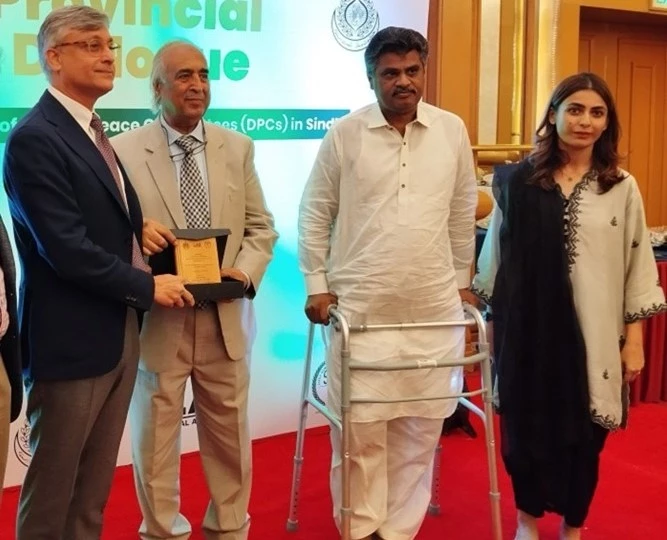Sindh Law Minister for inclusion of minorities, women in District Peace Committees

Stay tuned with 24 News HD Android App

Sindh Minister for Law, Religious Affairs, and Human Rights Muhammad Omer Soomro has strongly advocated for the inclusion of minorities, women, and marginalized communities in District Peace Committees (DPCs).
The event, "Provincial Dialogue on District Peace Committees' Future," was organized by Legal Aid Society (LAS), a Karachi-based NGO, in collaboration with the Sindh Human Rights Commission (SHRC) and the Auqaf, Religious Affairs, Zakat & Ushr Department (ARAZUD). The program brought together a wide range of officials, activists, and NGOs.
During his speech, the Law Minister commended the research conducted by the LAS which has produced a comprehensive working paper containing actionable recommendations for the enhancement and formalization of District Peace Committees throughout Sindh. Furthermore, he emphasized that the mandate of DPCs extends beyond their traditional role of overseeing Muslim religious festivals. Instead, he eloquently conveyed the foundational Islamic principles of peace and harmonious coexistence, especially pertinent in the face of current challenges to peace.
Omer Soomro urged the creation of clear and thorough Terms of Reference (TORs) for DPCs, vowing that his ministry would formalize and enforce them. This commitment signals a significant advancement for Sindh, emphasizing the importance of diverse voices for a united, cooperative, and peaceful environment.
In light of rising violence against minorities, and strained inter-communal relations in Sindh, the SHRC and LAS have consistently called for the activation of District Peace Committees to promote harmony. LAS recently completed a report assessing DPCs in Sindh, focusing on their functionality, coordination, and effectiveness, offering insights for policymakers and stakeholders to enhance peace efforts.
DPCs were introduced in Pakistan, drawing inspiration from effective international and national district-level models that promote community involvement in conflict resolution and the preservation of communal harmony. These committees operate under the authority of Deputy Commissioners (DCs) within each district. Comprising individuals designated and nominated by the respective DC, their primary mission, as stated in their notification, is to uphold religious harmony and foster peace within their districts. These DPCs play a vital role in facilitating cooperation among community members to address disputes and ensure the overall well-being of their communities.
The event commenced with Rukhsana Parveen Khokhar, Senior Program Manager at LAS, delivering introductory remarks. The gathering featured individuals representing a wide spectrum of religious beliefs who recited verses from their respective Holy texts. Following this, Mr Sukh Dev, a Board Member of SHRC, warmly welcomed the distinguished guests and provided a succinct overview of SHRC's mandate and mission. He highlighted SHRC's dedication to overseeing cases concerning marginalized communities and its proactive stance on addressing issues affecting religious minority groups, such as the Mandir dispute. To prevent such incidents, he stressed the importance of establishing district peace committees.
Continuing the proceedings, Maliha Zia, Associate Director of LAS, presented research findings that emphasized the underrepresentation of women and non-Muslims in DPCs. The report delved into the functionality, coordination, and effectiveness of DPCs, offering valuable insights to enhance peace-building efforts in the province. It also put forth actionable recommendations aimed at strengthening DPCs in Sindh, ultimately fostering peace, harmony, and dialogue within communities.
Zia also took charge of organizing the 'discussion' among the DPC members.
Chief Legal Advisor of the LAS Justice(R) Arif Hussain Khilji underscored the need to institutionalize DPCs and stressed the significance of meticulous member selection, ensuring a commitment to community service. He emphasized the importance of sensitization and advocated for respecting every individual regardless of their religious background.
Iqbal Ahmed Detho, Chairperson of SHRC, addressed the conference, commending the Legal Aid Society's research report. He advocated for the formation of a steering committee chaired by the Minister for Law to deliberate on the findings and activate District Peace Committees to their full potential. He underlined the critical need for legislative support, emphasizing that DPCs in Sindh currently lack a legal foundation. Iqbal Detho urged for amendments to establish these committees in law, enabling institutionalization, collaboration with relevant authorities, and the provision of capacity-building training and public awareness initiatives.
This dialogue provided a platform for DPC members to voice their concerns, share experiences, and propose recommendations for enhancing committee efficiency. Conference participants engaged in discussions about existing gaps in the system, underscoring the pivotal role of DPCs within Sindh. They collectively put forth recommendations for institutionalizing and strengthening District Peace Committees in Sindh. Their optimism lies in the belief that the diverse stakeholders contributing to the dialogue will shape a sophisticated legal framework, one that ensures the inclusion of religious minorities and women in these committees, thereby unlocking their full potential to play a transformative role in creating an environment of peace and harmony across different districts of Sindh and throughout Pakistan.
Prior to wrapping up the program, the LAS Chief Operating Officer Haya Emaan Zahid delivered her special remarks, expressing LAS's readiness to fulfil its role in empowering DPCs.
